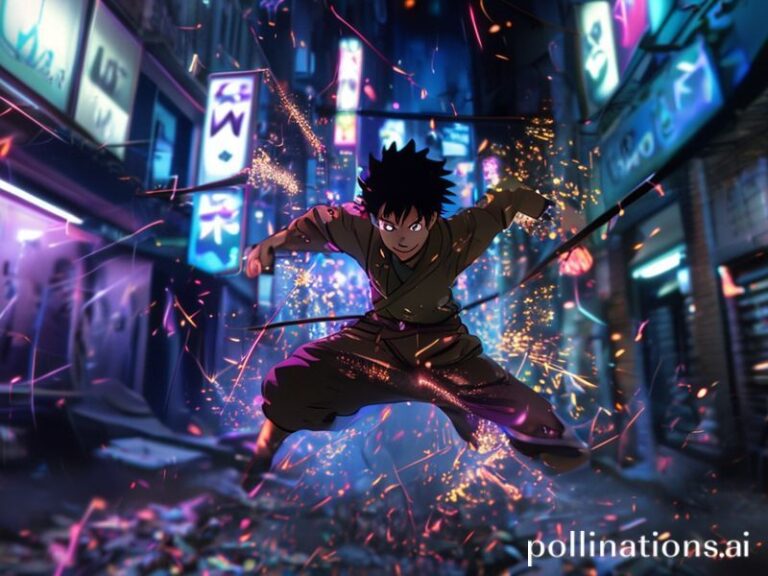Chief of War Season 2: When Pacific Fiction Becomes Global Policy Nightmare Fuel
Chief of War Season 2: How One Streaming Series Became the UN’s Favorite Punching Bag
By a Correspondent Who’s Spent Too Much Time in Airport Lounges
Geneva, 3 a.m.—the hour when diplomats realize the buffet has run out of shrimp and their talking points are as stale as the croissants. That’s precisely when the trailer for Chief of War Season 2 dropped on every screen from the duty-free shop to the departures board. Within minutes, the Palais des Nations had a new emergency agenda item: “Fictional Polynesian resource conflicts—strategic distraction or prophecy?” A Swedish delegate was overheard muttering, “Finally, something more chaotic than the Security Council.”
For the uninitiated, Chief of War is the prestige drama that dares to ask, “What if every geopolitical cliché got a tan and a lei?” Season 1 followed ex-Marine-turned-consultant-turned-accidental-kingmaker Kai Kawika as he weaponized island folklore, rare-earth metals, and an MBA to juggle Chinese port leases, French nuclear testing nostalgia, and American congressional aides who can’t spell ‘Melanesia.’ Season 2 ups the ante: imagine the Spratly Islands had a baby with Succession, then sent it to therapy in Brussels.
Global Context, or How to Exploit a Hemisphere for Content
Netflix’s algorithm—an omniscient beast that makes HAL 9000 look like a pocket calculator—calculated that nothing screams “binge-worthy” like micro-sovereignties bargaining away fishing rights for 5G towers. Consequently, the show’s production budget now rivals the GDP of Tuvalu, a fact Tuvalu’s finance minister gamely tweeted with a GIF of Scrooge McDuck. The series is shot on location from Tonga to Tbilisi, employing local crews who’ve learned to smile politely when a Hollywood grip explains how to hold a kava bowl “correctly.”
International Implications, or Why Your Foreign Minister Is Sleep-Deprived
Within 48 hours of release, three think tanks issued color-coded memos arguing whether the fictional “Treaty of Vai’ana” could be reverse-engineered for the South China Sea. Beijing called the show “cultural imperialism with better lighting,” while Paris simply surrendered any remaining moral high ground by offering the cast honorary citizenship and a vineyard. Meanwhile, the U.S. State Department hosted a “listening session” where interns deciphered plotlines for clues about Pacific policy—because nothing says superpower like crowdsourcing narrative arcs.
The broader significance? Chief of War has become the rare piece of pop culture that unites adversaries in pure, performative outrage. Moscow’s embassy in Wellington issued a statement condemning “Polynesian NATO expansionism,” apparently unaware that NATO can’t even expand reliably in Europe. The EU Parliament passed a non-binding resolution urging “responsible storytelling,” then adjourned for a three-hour lunch. Even the Vatican weighed in, observing that the show’s body count is “statistically less damning than most trade summits.”
Human Nature, or the Same Old Sharks in New Lagoons
Beneath the palm-fringed cynicism lies a familiar tale: everyone wants the cobalt, no one wants the locals. The writers’ room—staffed by refugees from defunct newspapers and one ex-ISIS hostage negotiator—claims they’re merely dramatizing “resource curse 2.0.” Critics counter that they’re laundering imperial nostalgia into Emmy bait. Both are right, which is why the show works. It’s Schadenfreude in swim trunks: we get to watch tiny islands outmaneuver superpowers while sipping Fairtrade rum and pretending we’d behave any better.
Conclusion: The World’s Newest Parlor Game
By Episode 6, Kai Kawika is brokering a deal to swap volcanic sand for submarine berths, an arrangement the IMF grades “innovative, if geologically suicidal.” In the real world, Pacific leaders have started quoting the show in actual negotiations—because nothing terrifies a multinational like being accused of plagiarizing a fictional warlord. Season 3 is already green-lit, contingent on Fiji not sinking before post-production wraps.
So, dear reader, as you queue for your next redeye flight, note the glazed eyes of the envoy ahead of you. He’s not jet-lagged; he’s just finished the finale and realized the joke is on all of us. Chief of War isn’t just entertainment—it’s a mirror, cracked and sun-bleached, reflecting an international order that can’t decide whether to apologize or monetize the shards. Either way, the popcorn’s complimentary.







